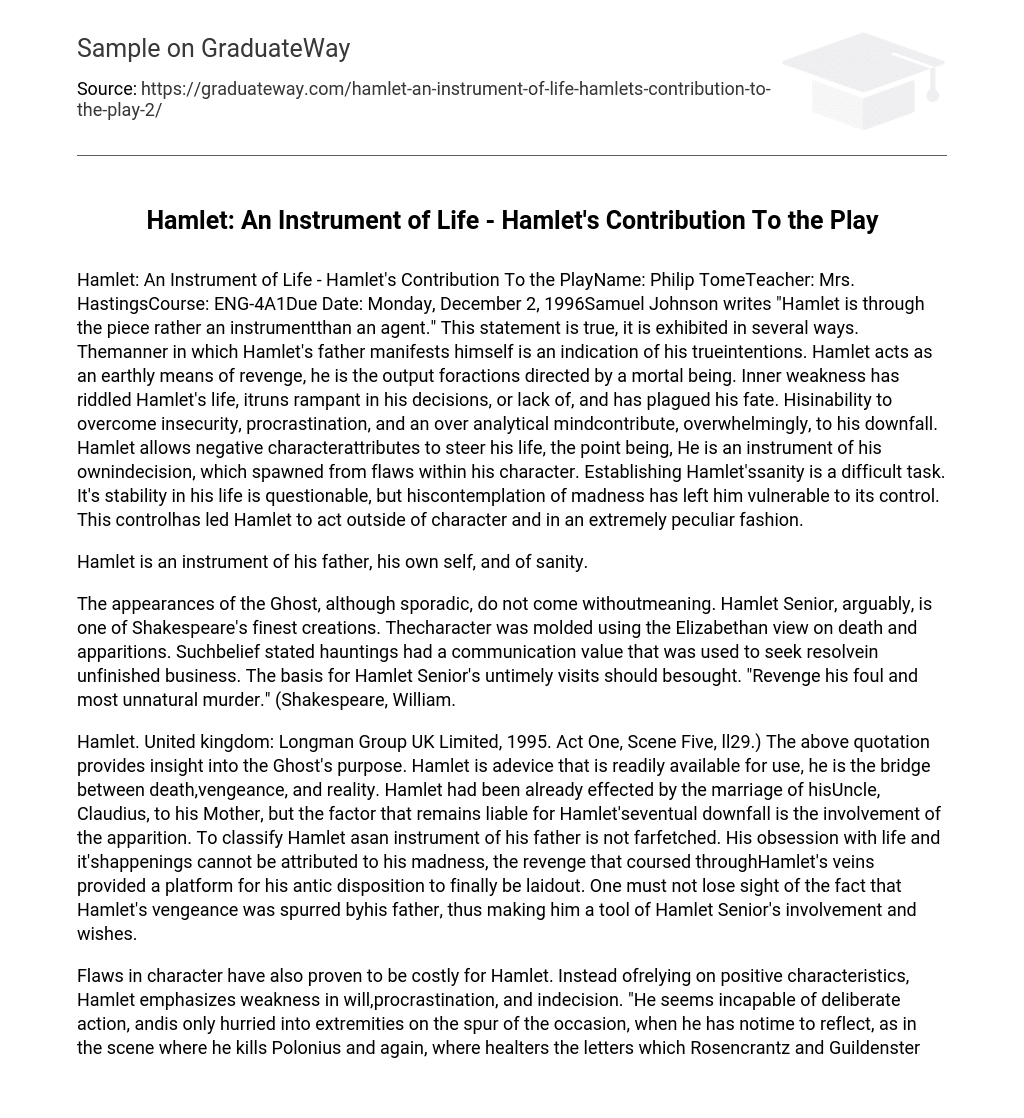Hamlet: An Instrument of Life – Hamlet’s Contribution To the PlayName: Philip TomeTeacher: Mrs. HastingsCourse: ENG-4A1Due Date: Monday, December 2, 1996Samuel Johnson writes “Hamlet is through the piece rather an instrumentthan an agent.” This statement is true, it is exhibited in several ways. Themanner in which Hamlet’s father manifests himself is an indication of his trueintentions. Hamlet acts as an earthly means of revenge, he is the output foractions directed by a mortal being. Inner weakness has riddled Hamlet’s life, itruns rampant in his decisions, or lack of, and has plagued his fate. Hisinability to overcome insecurity, procrastination, and an over analytical mindcontribute, overwhelmingly, to his downfall. Hamlet allows negative characterattributes to steer his life, the point being, He is an instrument of his ownindecision, which spawned from flaws within his character. Establishing Hamlet’ssanity is a difficult task. It’s stability in his life is questionable, but hiscontemplation of madness has left him vulnerable to its control. This controlhas led Hamlet to act outside of character and in an extremely peculiar fashion.
Hamlet is an instrument of his father, his own self, and of sanity.
The appearances of the Ghost, although sporadic, do not come withoutmeaning. Hamlet Senior, arguably, is one of Shakespeare’s finest creations. Thecharacter was molded using the Elizabethan view on death and apparitions. Suchbelief stated hauntings had a communication value that was used to seek resolvein unfinished business. The basis for Hamlet Senior’s untimely visits should besought. “Revenge his foul and most unnatural murder.” (Shakespeare, William.
Hamlet. United kingdom: Longman Group UK Limited, 1995. Act One, Scene Five, ll29.) The above quotation provides insight into the Ghost’s purpose. Hamlet is adevice that is readily available for use, he is the bridge between death,vengeance, and reality. Hamlet had been already effected by the marriage of hisUncle, Claudius, to his Mother, but the factor that remains liable for Hamlet’seventual downfall is the involvement of the apparition. To classify Hamlet asan instrument of his father is not farfetched. His obsession with life and it’shappenings cannot be attributed to his madness, the revenge that coursed throughHamlet’s veins provided a platform for his antic disposition to finally be laidout. One must not lose sight of the fact that Hamlet’s vengeance was spurred byhis father, thus making him a tool of Hamlet Senior’s involvement and wishes.
Flaws in character have also proven to be costly for Hamlet. Instead ofrelying on positive characteristics, Hamlet emphasizes weakness in will,procrastination, and indecision. “He seems incapable of deliberate action, andis only hurried into extremities on the spur of the occasion, when he has notime to reflect, as in the scene where he kills Polonius and again, where healters the letters which Rosencrantz and Guildenstern are taking with them toEngland purporting his death.” (Bratchell, D.F. Shakespearean Tragedy. New York:Routledge, 1990.) Hamlet has fallen to a poor will, he acts blindly andtherefore behaves in a harsh manner and without cause. “Begin murderer; pox,leave thy damnable faces and begin. Come; the croaking raven doth bellow forrevenge.” (Act Three, Scene Two, ll 258.) His obsession with revenge isterrifying, it has mangled his thoughts and damaged his will. “He clearly was aheroic revenger, a procrastinator, lost in thought and weak of will.” (Courtney,Richard. Shakespeare’s World of Death: the early tragedies. Toronto, Simon ;Pierre Publishing Company Limited, 1995.) Hamlet is a brave soul, but his senseof good judgement wanders, and procrastination becomes more apparent with eachnew day. It is by his “…Careless of death” attitude that Hamlet “loses thepower of action in the energy of resolve.” (Bratchell, D.F. ShakespeareanTragedy.)Madness can be taken on in two forms, one being the insanity of mind andthe latter being of the heart. Madness of the mind would entail that a personis capable of planning and scheming harmful events and/or weapons. Madness ofthe heart is much more devastating. To be mad at heart would mean that theability to make critical decisions is still present. Hamlet is mad on bothlevels. “His contradictory extremes of conduct were reminiscent of theElizabethan accounts of melancholy…Such an approach makes Hamlet mostly madand rarely sane.” (Courtney, Richard. Shakespeare’s World of Death: the earlytragedies.) Courtney comments on Hamlet’s feelings in relation to his actions.
Hamlet’s mind, on occasion is critical, but his actions are those of a madman.
The madness that pervades him is, ironically, admitted easily. “I essentially amnot in madness, but mad in craft.” (Act Three, Scene Four, ll 206-207.) He isconscious of his actions and openly admits to madness in them. The problem thatlies is its control. Sanity is questioned to the point that it has becomeoverbearing and manipulative. It has molded Hamlet’s life, he no longer hascommand, it is has been lost in madness.
The Ghost of Hamlet Senior, indecision, and sanity are important factorsthat contribute immensely to Hamlet’s life. His actions in life will surely beremembered in purgatory, but what must be examined is his individuality. He, byno means, was a leader. His indecision, which lasted for months at a time,revealed his character. The decisions that his actions backed were clearly madein haste and can be to the credit of an outside force. Sanity and life, twofactors that rip Hamlet in two, are result of an overactive mind that hascountered all action through the ability to find reason in inaction. Hisfollower and procrastinating lifestyle has made him an instrument of manyelements within his life.
Works Cited1. Shakespeare, William. Hamlet. United Kingdom: Longman Group UK Limited,1995.
2. Bratchell, D.F. Shakespearean Tragedy. New York: Routledge, 1990.
3. Courtney, Richard. Shakespeare’s World of Death: the early tragedies.
Toronto: Simon ; Pierre Publishing Company Limited, 1995.





